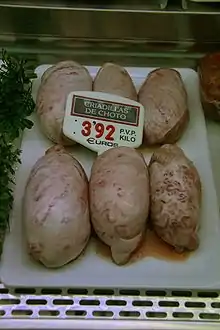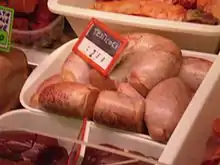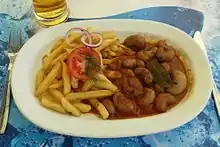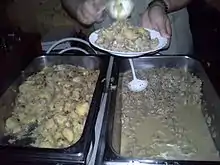Testicles as food
The testicles of calves, lambs, roosters, turkeys, and other animals are eaten in many parts of the world, often under euphemistic culinary names. Testicles are a by-product of the castration of young animals raised for meat, so they were probably a late-spring seasonal specialty,[1] though nowadays they are generally frozen and available year-round.




Cookery
Testicles are cooked in a variety of ways: sautéed and sauced, fricasseed, deep-fried with breading or batter, in pies, poached, roasted, and so on. Before cooking, they are generally scalded, skinned, and soaked in cold water.[2]
Names
In English, testicles are known by a wide variety of euphemisms, including "stones", "Rocky Mountain oysters", "prairie oysters" and sweetbread.[1][3] Lamb testicles are often called 'lamb fries' or simply fries (though that may also refer to other organ meats).[4]
Euphemisms are used in many other languages. In Arabic countries such as Lebanon and Syria or Iraq they are known as "baid ghanam" and in Turkey they are known as koç yumurtası which in both languages means sheep eggs.[5]
In some Spanish-speaking countries in Latin America, they are known as huevos de toro, "bull eggs"; in Chinese, as Simplified Chinese: 牛宝; Traditional Chinese: 牛寶; Pinyin: niú bǎo, "ox treasures"; in Greek, as αμελέτητα, "unmentionables"; in Hindi, as "Kapura".
The French animelles (lit. 'innards'), the Italian granelli (lit. 'granules'), and the Spanish and Latin American criadillas (lit. 'little maids') began as euphemisms, but have become standard culinary names.[6][7]
World variants
Canada
Known as 'prairie oysters' in Canada, they are normally served deep-fried and breaded, with a demi-glace.[8] The dish is especially popular in parts of Canada, where cattle ranching is prevalent and castration of young male animals is common.
Syria
In Syria baid ghanam or sheep testicles are grilled in lemon juice and garnished in parsley.
India and Pakistan
In India and Pakistan, goat testicles and kidneys are mashed up and cooked on a Tava. The dish is called Gurda-Kapoora. In Lahore, the dish is called Kata-kat.[9]
United States
In the United States, bull testicles are usually served breaded and deep-fried as an appetizer, under the name "Rocky Mountain oysters".[10]
Spain
Buffalo, boar or bulls testicles known as criadillas are breaded and fried;[11] In tortilla Sacromonte, a speciality from Granada, lambs brains and testicles are cooked in an omelette.[12]
Vietnam
Bulls testicles is commonly called "Ngầu pín". It is a very common food as it is believed to increase men's sexual ability.[13]
References
- Mason, Laura (2014). Davidson, Alan (ed.). The Oxford Companion to Food. Oxford University Press. p. 816. ISBN 9780199677337.
- Prosper Montagné, Larousse Gastronomique, 1938
- Oxford English Dictionary s.v. 'stone' 11a, 'mountain' and 'prairie oyster' 2
- Oxford English Dictionary, s.v. 'fry' n2 2b
- Hosking, Richard (2010). Food and Language: Proceedings of the Oxford Symposium on Food and Cooking 2009. Oxford Symposium. ISBN 9781903018798.
- Tresor de la langue française s.v. animelles
- Treccani on line s.v.
- metacafe.com. "Testicle Festival in Calgary Alberta". Metacafe.
- Kochhar, Atul (2015). Atul's Curries of the World. Bloomsbury Publishing. p. 140. ISBN 9781472932778.
- Stradley, Linda (20 May 2015). "Rocky Mountain Oysters History and Recipe". What's Cooking America. Retrieved 20 October 2019.
- Castro, Lourdes (2009). Eat, Drink, Think in Spanish: A Food Lover's English-Spanish/Spanish-English Dictionary. Potter/Ten Speed/Harmony/Rodale. p. 124. ISBN 9781580084017.
- Richardson, Paul (2007). Late Dinner: Discovering the Food of Spain. Simon and Schuster. pp. 135–136. ISBN 9781416545392.
- vi:Ngầu pín
External links
![]() Media related to testicles (meat) at Wikimedia Commons
Media related to testicles (meat) at Wikimedia Commons